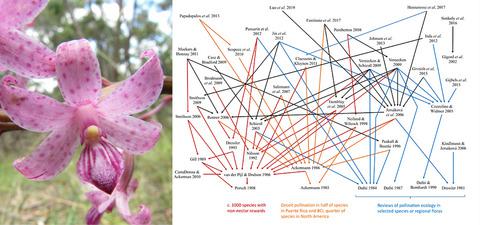当前位置:
X-MOL 学术
›
Plant Biol.
›
论文详情
Our official English website, www.x-mol.net, welcomes your
feedback! (Note: you will need to create a separate account there.)
Rewardlessness in orchids: how frequent and how rewardless?
Plant Biology ( IF 4.2 ) Pub Date : 2020-03-17 , DOI: 10.1111/plb.13113 M Shrestha 1, 2, 3 , A G Dyer 2 , A Dorin 3 , Z-X Ren 4 , M Burd 1
Plant Biology ( IF 4.2 ) Pub Date : 2020-03-17 , DOI: 10.1111/plb.13113 M Shrestha 1, 2, 3 , A G Dyer 2 , A Dorin 3 , Z-X Ren 4 , M Burd 1
Affiliation

|
About one‐third of orchid species are thought to offer no floral reward and therefore attract pollinators through deception. Statements of this idea are common in the botanical literature, but the empirical basis of the estimate is rarely mentioned. We traced citation pathways for the one‐third estimate in a sample of the literature and found that the paths lead to empirical foundations that are surprisingly narrow. Moreover, recent measurements have detected minute quantities of sugar available to insect visitors in some orchids thought to be rewardless, raising the possibility of a pollination strategy that is largely deceitful but different to absolute rewardlessness. The orchids are a well‐studied group and there is no doubt that rewardlessness is common in the family. However, greater empirical effort is needed to verify rewardlessness in orchids and to explore geographic and environmental variation in the proportion of rewardless species.
中文翻译:

兰花无情:多么频繁和多么无酬?
据认为,约有三分之一的兰花没有花香,因此通过欺骗吸引了传粉者。在植物学文献中对这种想法的陈述是很普遍的,但是很少提到估计的经验基础。我们在文献样本中追踪了三分之一估计值的引文路径,发现这些路径导致经验基础非常狭窄。此外,最近的测量已经检测到一些兰花中的昆虫访客可获得的微量糖,这些兰花被认为是无益的,这增加了一种传粉策略的可能性,该策略在很大程度上是欺骗性的,但与绝对无益的不同。兰花是经过精心研究的群体,毫无疑问,无奖赏在家庭中很常见。然而,
更新日期:2020-03-17
中文翻译:

兰花无情:多么频繁和多么无酬?
据认为,约有三分之一的兰花没有花香,因此通过欺骗吸引了传粉者。在植物学文献中对这种想法的陈述是很普遍的,但是很少提到估计的经验基础。我们在文献样本中追踪了三分之一估计值的引文路径,发现这些路径导致经验基础非常狭窄。此外,最近的测量已经检测到一些兰花中的昆虫访客可获得的微量糖,这些兰花被认为是无益的,这增加了一种传粉策略的可能性,该策略在很大程度上是欺骗性的,但与绝对无益的不同。兰花是经过精心研究的群体,毫无疑问,无奖赏在家庭中很常见。然而,











































 京公网安备 11010802027423号
京公网安备 11010802027423号